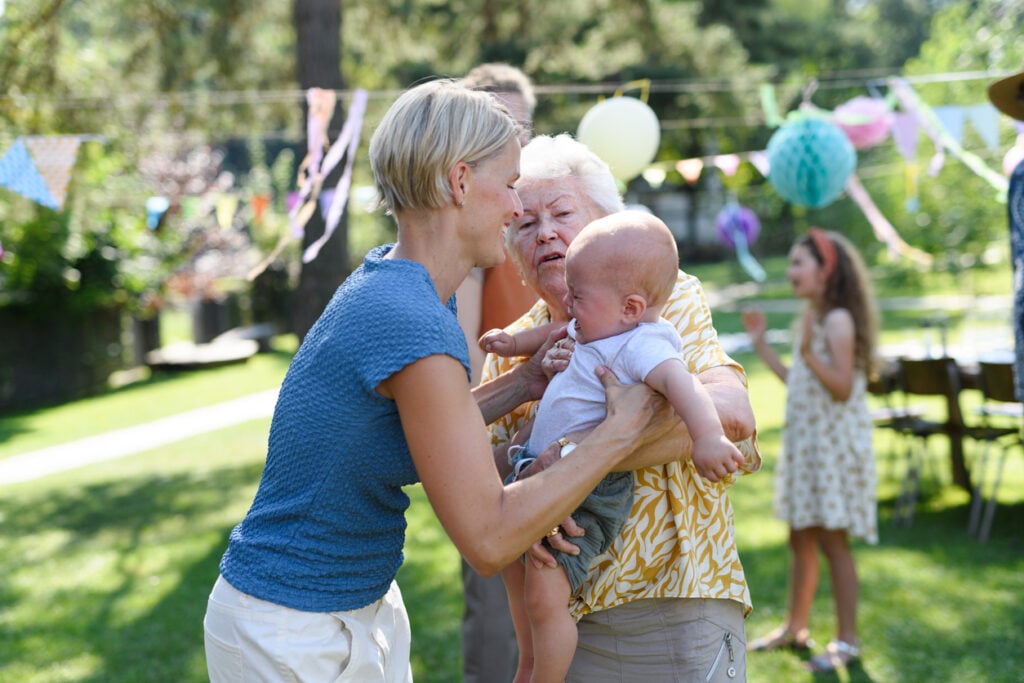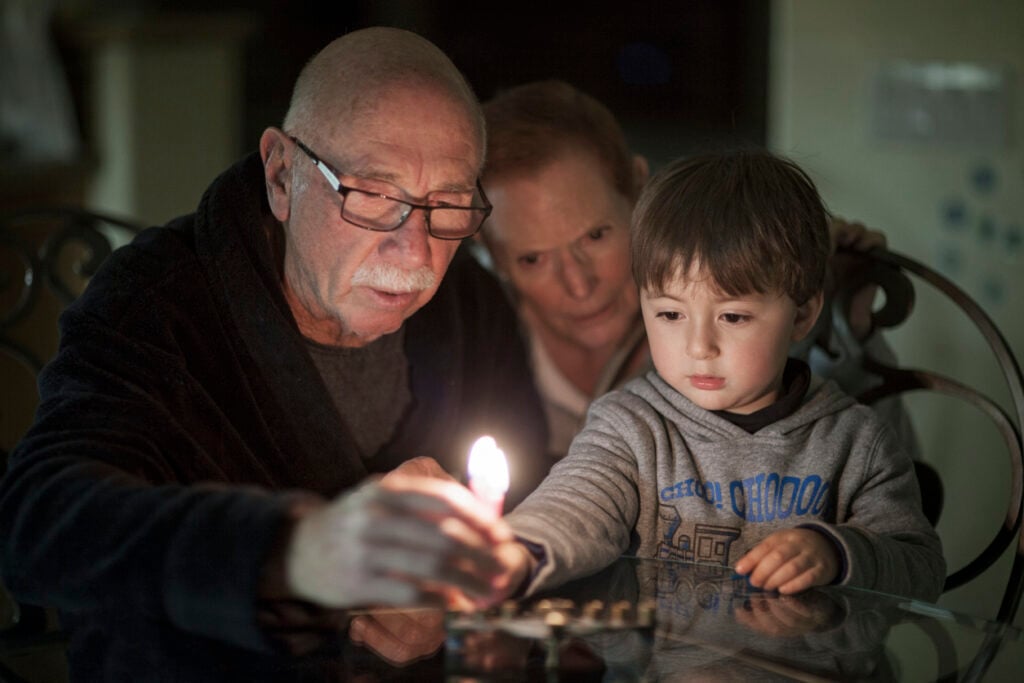Some family traditions feel sacred—until you realize they’re doing more harm than good.

Not all traditions deserve to be passed down. Some started with good intentions but have morphed into harmful cycles that reinforce guilt, obligation, or even emotional manipulation. The pressure to uphold family customs can make it hard to see when a tradition is actually unhealthy. But just because something has “always been done this way” doesn’t mean it should continue.
Here are some long-held family traditions that might be more harmful than you realize.
1. Forcing kids to hug or kiss relatives.

It seems harmless—teaching children to greet relatives with hugs and kisses is often framed as a sign of respect. But when kids are forced to show physical affection, it sends a troubling message that their comfort and personal boundaries come second to tradition. They may learn that saying no isn’t an option, which can make it harder for them to enforce boundaries later in life.
Instead of making hugs and kisses mandatory, let children decide how they want to greet others. A handshake, a wave, or even a simple verbal greeting should be just as acceptable, according to Patheos. Teaching kids that their body belongs to them fosters confidence and autonomy, which is far more valuable than any forced display of affection.
2. Keeping toxic family members in your life “because they’re family.”

The idea that blood ties should override all wrongdoing is one of the most damaging traditions out there. Some families insist that no matter how much pain a relative causes, cutting them off is unacceptable, as stated by Thrive for the People. This mindset forces people to tolerate manipulation, abuse, or neglect just to avoid rocking the boat.
Healthy relationships are built on mutual respect, not obligation. If a family member is consistently toxic, setting boundaries—or even distancing yourself entirely—can be the healthiest choice. Family should be about love and support, not enduring mistreatment out of guilt.
3. Expecting the eldest child to take on a parental role.

In many families, the oldest child is automatically assigned extra responsibilities, whether they like it or not. They’re expected to care for younger siblings, act as a second parent, and be the one who “knows better.” While responsibility can build character, forcing an eldest child into a parental role robs them of a normal childhood, as reported Isabel Mata of Wondermind.
This kind of parentification leads to burnout, resentment, and even struggles with adult relationships. Siblings should support each other, but parenting is an adult responsibility. If the eldest is always expected to sacrifice their own needs for the sake of the family, it’s time to rethink this tradition.
4. Prioritizing family over personal well-being.

Many families operate under the unspoken rule that family obligations come before everything else. Canceling plans, neglecting self-care, or even staying in unhealthy relationships is justified with the phrase, “But they’re family.” This expectation can lead to resentment and exhaustion.
Personal well-being should never take a backseat to family traditions. Healthy families recognize that individual happiness matters and don’t guilt members into self-sacrifice. If being part of the family dynamic consistently drains you, it’s okay to step back and set limits.
5. Making holidays about obligation instead of joy.

Holidays should be a time for connection and celebration, but many families turn them into a stressful obligation. Whether it’s a rigid schedule, mandatory gatherings, or guilt-tripping those who can’t attend, these traditions turn festive seasons into anxiety-ridden events.
No one should feel forced to spend time with family out of duty. It’s okay to set boundaries around holidays, celebrate in ways that feel fulfilling, or even skip them entirely. If a holiday tradition brings more stress than joy, it might be time to rethink how it’s celebrated.
6. Expecting women to do all the emotional labor.

In many families, women are automatically assigned the role of caregiver, peacekeeper, and emotional support system. They’re expected to organize gatherings, remember birthdays, smooth over conflicts, and provide endless support—often without acknowledgment.
This imbalance is exhausting and unfair. Emotional labor should be shared, not placed on one person’s shoulders. Families function better when responsibilities are distributed equally, rather than reinforcing outdated gender roles.
7. Using guilt as a tool for control.

Phrases like “After everything I’ve done for you” or “You’ll regret it when I’m gone” are often disguised as expressions of love, but they’re really just manipulation. Guilt shouldn’t be the foundation of family relationships, yet many traditions reinforce the idea that obedience and sacrifice are measures of loyalty.
Healthy families communicate openly and respect boundaries. Love shouldn’t come with emotional blackmail attached. If a tradition relies on guilt rather than genuine connection, it’s not a tradition worth keeping.
8. Tolerating bad behavior at family gatherings.

Every family has that one relative who makes inappropriate jokes, stirs up drama, or drinks too much. Instead of addressing the behavior, many families shrug it off with, “That’s just how they are.” The expectation is that everyone tolerates it to keep the peace.
But enabling bad behavior only allows it to continue. Setting boundaries and holding people accountable doesn’t ruin family gatherings—it makes them more respectful and enjoyable for everyone involved.
9. Forcing kids to participate in religious practices.

Passing down religious traditions can be meaningful, but forcing children to participate against their will can backfire. When religion is presented as an obligation rather than a choice, it often breeds resentment rather than faith.
Children should be allowed to explore their own beliefs and develop their own spiritual identities. A tradition rooted in coercion isn’t truly about faith—it’s about control.
10. Shaming family members for their lifestyle choices.

Some families have strict expectations about career paths, marriage, children, or even personal interests. If someone strays from these expectations, they’re met with criticism, gossip, or passive-aggressive remarks. This kind of judgment stifles individuality and creates unnecessary tension.
Families should be a source of support, not shame. If a tradition involves tearing someone down for being different, it’s not a tradition worth keeping.
11. Overlooking mental health struggles.

Many families still treat mental health issues as taboo, brushing them off as weakness or overreacting. The expectation to “just deal with it” prevents people from seeking help and normalizes suffering in silence.
A healthy family tradition would prioritize mental well-being and encourage open conversations about struggles. No one should have to hide their pain to fit into a dysfunctional family dynamic.
12. Holding onto toxic heirlooms and legacies.

Some family traditions involve passing down heirlooms or continuing legacies that come with emotional baggage. Maybe it’s an expectation to run the family business, uphold outdated values, or maintain ties to something that feels suffocating rather than meaningful.
It’s okay to break free from traditions that don’t align with who you are. You don’t have to carry the weight of the past just because it was handed to you.
13. Expecting absolute loyalty at all costs.

Many families push the idea that loyalty means standing by each other no matter what—even when someone is in the wrong. This mindset enables toxic behavior and discourages accountability.
True loyalty doesn’t mean tolerating abuse or enabling destructive habits. It means standing up for what’s right and fostering relationships built on respect and honesty. If a tradition demands blind loyalty, it might be time to reconsider its place in your life.
